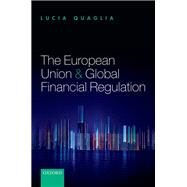The European Union and Global Financial Regulation
, by Quaglia, Lucia- ISBN: 9780199688241 | 0199688249
- Cover: Hardcover
- Copyright: 8/26/2014
The European Union and Global Financial Regulation examines the influence of the European Union (EU) in regulating global finance, addressing several inter-related questions. Why does the EU 'upload' international financial regulation in some cases, 'download' it in other cases, and 'cross-load' either actively or passively in other instances? Has this changed over time, especially after the third stage of Economic and Monetary Union and the completion of the single financial market, or after the global financial crisis? Under what conditions is the EU more or less likely to upload, download or cross load rules? Through which mechanisms does this take place? Overall, does the EU act as a pace setter in regulating global finance, or is it mainly a follower? Why?
The key explanatory variable used in this research is the concept of 'regulatory capacity', applied to the EU and the US, distinguishing between 'strong' and 'weak' regulatory capacity. The influence of the EU in global financial regulation depends on the combinations of EU and US regulatory capacities. When EU regulatory capacity is weak and US regulatory capacity is strong, the US will mainly upload its domestic rules internationally and/or actively cross load them to the EU, whereas the EU will mainly download international rules. When the EU regulatory capacity is strong and US regulatory capacity is weak, the EU is able to upload its rules internationally and/or actively cross load them to third countries. When the EU and the US regulatory capacities are weak, private sector governance prevails. When the EU and US regulatory capacities are strong, both jurisdictions seek to upload and cross load their domestic rules.
The key explanatory variable used in this research is the concept of 'regulatory capacity', applied to the EU and the US, distinguishing between 'strong' and 'weak' regulatory capacity. The influence of the EU in global financial regulation depends on the combinations of EU and US regulatory capacities. When EU regulatory capacity is weak and US regulatory capacity is strong, the US will mainly upload its domestic rules internationally and/or actively cross load them to the EU, whereas the EU will mainly download international rules. When the EU regulatory capacity is strong and US regulatory capacity is weak, the EU is able to upload its rules internationally and/or actively cross load them to third countries. When the EU and the US regulatory capacities are weak, private sector governance prevails. When the EU and US regulatory capacities are strong, both jurisdictions seek to upload and cross load their domestic rules.







